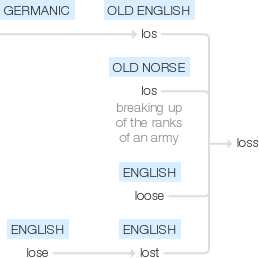Loss
Old English los ‘destruction’, of Germanic origin; related to Old Norse los ‘breaking up of the ranks of an army’ and loose; later probably a back-formation from lost, past participle of lose.
wiktionary
From Middle English los, from Old English los(“damage, destruction, loss”), from Proto-Germanic *lusą(“dissolution, break-up, loss”), from Proto-Indo-European *lews-(“to cut, sunder, separate, loose, lose”). Cognate with Icelandic los(“dissolution, looseness, break-up”), Old English lor, forlor(“loss, ruin”), Middle High German verlor(“loss, ruin”). More at lose.
Pronunciation spelling of lost, representing African-American Vernacular English.
etymonline
loss (n.)
Old English los "ruin, destruction," from Proto-Germanic *lausa- (from PIE root *leu- "to loosen, divide, cut apart"), with an etymological sense of "dissolution." But this seems scarcely to have survived in Middle English, and the modern word, with a weaker sense, "failure to hold, keep, or preserve what was in one's possession; failure to gain or win," probably evolved 14c. from lost, the past participle of lose.
Phrase at a loss "confused, uncertain" (1590s) is a phrase from hunting, in reference to hounds losing the scent. To cut (one's) losses is from 1885, originally in finance. The retailer's loss-leader "advertised product sold at cost or below" (to entice customers in to buy other things as well) is from 1922.
